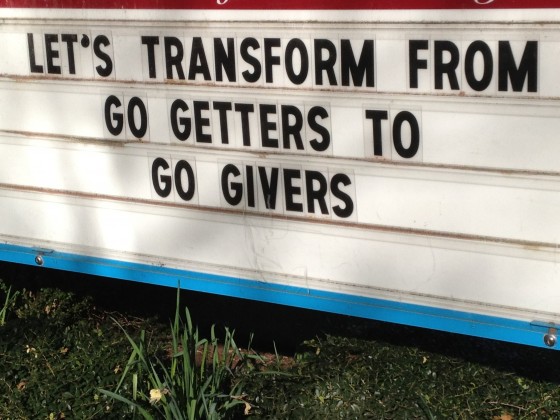
A couple of years ago, I read a book called The Go-Giver. The book’s lessons are delivered in the form of a parable about a young go-getter who is introduced to an older, wiser man, who teaches him about go-giving—putting others’ interests first and adding value to their lives. It’s a quick and easy read: a heart-warming book, which will help you to be happier and more successful, or reinforce what you are already doing.
While I enjoyed the book, and would recommend it enthusiastically, I wasn’t sure what the take-aways were for me. Then, a short while later, there was a two-week period where every time I was flipping TV channels, I would come across the Jim Carrey movie, Yes Man. It was during a time when I was watching very little TV, so it was especially notable that I kept stumbling upon this one movie. I had found the movie to be “okay” when I took my kids to see it in a theater during their school Christmas break in late 2008. Now, watching again, in bits and pieces, it grew on me.
At the start of Yes Man, Carrey’s character, Carl Allen, is a “No” Man. In a post-divorce funk, Carl says no to everything—from offers from friends to social events, to opportunities to better his career.
One day, he runs into an extremely upbeat acquaintance he hasn’t seen in a long time, who encourages him to attend a “Yes” seminar that had made a huge, positive difference in his life. Carl reluctantly attends the seminar and walks out unconvinced, but willing to try the strategy of saying “yes” to everything. Of course, being a movie, becoming a “yes” man helps Carl to turn his life around for the better.
I began to think that I could be more of a go-giver by saying yes to more things. I decided to focus on that for 21 days in order to help turn saying “yes” and “go-giving” into a habit.
Finding opportunities to say “yes” wasn’t hard. During the first 21 days I was presented with many chances to say “yes” to invitations—business functions, charity events, and meetings to develop new relationships. I also listened longer than usual to cold calls.
By saying “yes”, I felt nicer. I felt that I was giving more (go-giving) and I loved that feeling. Since then, I don’t say “yes” to everything (a conclusion Carl also came to in the movie), but I say “yes” more often and enjoy being more open-minded about opportunities that present themselves. This attitude has also resulted in a wonderful by-product at parties—whether the business-type, cocktail party or any other get together with a large group of people.
Did you ever go to a party and get “stuck” talking with someone? I have changed my way of experiencing those events so that now I enjoy spending time with whomever I end up with. By staying “present” with that person, and not “trying to get away”, I’ve learned things about people that I never would have, I like them better than I thought or imagined, and I’ve had experiences that were more enjoyable overall. Another happiness strategy.
One of my favorite authors is Lama Surya Das. In his book, Buddha is as Buddha Does, he says that the Buddha taught that the greatest act of all is the act of giving—giving the best of what we have, without reservations, hesitation, or regret. During those first 21 days I had the pleasant experience of having more than one person tell me that they appreciated that I was being more open—doing things, and being more giving of the high level gift of my time and attention. Pretty cool.
What are your experiences? Join the conversation with your comments…
Best regards,
David
p.s. Thanks to my terrific coach Brandie Hinen for recommending The Go-Giver—and for everything else.
